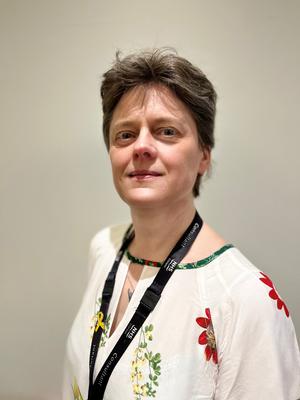Dr Karen Mitchell, Consultant in Chemical Pathology
I describe myself as an interpreter: between the clinician and the laboratory, and a detective: identifying the condition from the results

Can you tell us what chemical pathology is?
Chemical pathology covers chemical and metabolic processes within the body. We cover laboratory testing of chemicals e.g. electrolyte, hormones and drugs in bodily fluids, but mostly blood, and also have a clinical role seeing patients. This is mostly through outpatient specialist clinics, but also provide advice and review for inpatients with biochemical or metabolic conditions.
Can you tell us about your average working day?
Generally there is no average day. I spend a day a week as duty biochemist, reviewing abnormal results and speaking with clinicians, and dealing with any specific laboratory issues that occur. I have an outpatient clinic once a week for patients with lipid disorders which includes a mix of patients with inherited cholesterol disorders and those who experienced problems with medication. Due to the geography of north east Scotland, the clinic is a mix of in person, video and telephone consultations which can be a challenge at times. Every four weeks I am the consultant on call and oversee the parenteral (intra-venous) nutrition team ward rounds within the hospital. I also have an outpatient clinic once a month for patients who are receiving parenteral nutrition at home. My other interest is Clinical Informatics, and I have taken on the role of the Pathology Informatics Committee at the college.
My day may have some fixed activities, but I can be dealing with issues relating to any of these interests all within one day
What kind of work does your job involve?
I practice medicine mostly from my desk. I describe myself as an interpreter: between the clinician and the laboratory, and a detective: identifying the condition from the results, or finding the correct test for the condition; depending who is asking the question. I work within a team and communicate with colleagues, clinicians and patients on a regular basis.
Why did you choose this specialty?
I didn’t have one specialty in mind at medical school. I enjoyed the undergraduate laboratory medicine teaching but wasn’t aware of this as a career path until I was a junior doctor on the wards. The laboratory staff said “you need to speak to our chemical pathologist”. I enjoyed the mix of laboratory and clinical elements and problem solving from a number of test results, and thought this would be an exciting career. I completed my registrar training in Oxford and then became a consultant in West Yorkshire. I recently moved to Aberdeen to work at a teaching hospital within a larger team and expand my areas of interest.
What do you enjoy most about your chosen specialty?
Every day is different and has an unpredictable element. I enjoy the variation within the specialty and that not everyone has the same mix of interests so I am always learning something new and haven’t found a consultant who does all the same interests as me. I work alongside clinical scientists and biomedical scientists, and the mix of knowledge and skills from everyone provides the perfect balance of clinical and laboratory parts of my week.
What do you find most rewarding about the role?
I had a patient who was referred to my clinic and when I told them they had an inherited condition they were so grateful to finally have an answer. This changed their outlook and approach to their own health.
It is rewarding to help clinicians identify and manage metabolic conditions in their patients and knowing that we can help with diagnosis and interpretation of complicated results.
Chemical pathology is not a well-known specialty and I am often met with surprise when people find out there are doctors within the laboratory and the multiple roles that we can have.
What advice would you give to students looking to enter your field?
Contact your local biochemistry or blood sciences laboratory. There will be either a Chemical Pathologist or Clinical Scientist in the department who will be able to provide you with relevant local information. There are plenty of opportunities from meeting the clinical team, tours of the department or attending outpatient clinics.
Some medical schools still provide a specific laboratory medicine course as part of the undergraduate curriculum which may have a chemical pathologist providing the teaching. If not, contact your local department to ask if you can help out with an audit or project.
We are keen to meet the next generation of doctors for our specialty and those who have experience from their local departments will understand the fascination and inquisitive nature we have, and how unpredictable the day can be.
